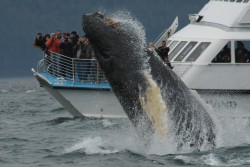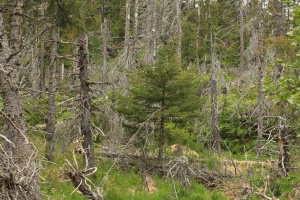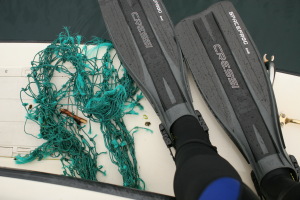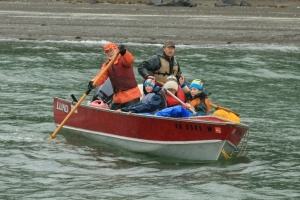
 Share This Page
Share This Page| Home | | Sailing | | Alaska 2008 | |  |  Share This Page Share This Page |

Copyright © 2008, P. Lutus. All rights reserved. Message Page
(double-click any word to see its definition)
Apart from the weather, Alaska in 2008 was a good year. I learned some new things about my boat (there's always more to learn about one's boat), I tried camping out on the land for a change, I rescued a boat near Juneau, and I took some spectacular whale pictures.
Here is an overview of the 2008 season.
WeatherNew Orleans (a digression) Dead spruce trees near Homer.
Dead spruce trees near Homer.According to this press account, Alaska temperatures in 2008 were "third lowest on record." Charter operators in Valdez reported mass cancellations during July, and by the beginning of August, snow had resumed along the high ridges. In Anchorage the temperature climbed above 70°f on just two days during July.
I had reasonably good luck with the weather — because of my cruising experience I know where to go to maximize chances for a sunny day. And I've established a strategy to deal with Alaska weather — there's always a computer programming project, or a book to read, or a mechanical repair waiting for my attention.
It was really cold and wet. Does this contradict the idea of global warming? No, not at all. Arctic ice is melting very rapidly, to the degree that ships can now transit the Arctic region by way of two routes heretofore closed by solid ice (the fabled Northwest Passage and another route called the Eastern Passage). This melting means more water vapor is released into the atmosphere, and (apart from producing more rain) water vapor is a potent greenhouse gas, responsible for about 60% of global warming (CO2 contributes about 20%).
The Arctic ice is melting at such a rapid pace that some scientists predict all the ice will be gone within a decade. This will have very serious consequences for polar bears, some of whom are already drowning as they try to swim the widening gap between land to the edge of the Arctic ice pack.
My readers will notice a seeming paradox — a record melt of Arctic ice, but temperatures lower than usual in July. Well, water vapor quickly forms clouds which reflect a lot of solar energy, causing a decline in temperatures at a time of year when people expect warmer weather. But the average yearly temperature has been climbing rather quickly, sufficient to stress and kill large tracts of spruce trees, which can't survive the warm weather.
As to the issue of sea levels rising worldwide, when floating ice melts, it doesn't cause sea levels to rise (to see why, float an ice cube in a glass of water and watch it melt). But the Greenland ice sheet, located over land, is also melting very quickly, much faster than had been predicted, and this will substantially raise sea levels. Combine this with the Antarctic melting, at a rate now known to be roughly equal to that of Greenland, and you have a situation that in a surprisingly short time will render many coastal cities uninhabitable.
Why Go To Alaska?Pardon this digression from Alaska topics. Some of my regular readers will remember my having mentioned this earlier, but as each year passes, it becomes more obvious that New Orleans is not a suitable place for human habitation. Factors that may quickly render New Orleans uninhabitable are the worldwide rise in sea level discussed above, plus a gradual warming of Atlantic and Gulf of Mexico waters, which represent the power source for increasingly frequent and ferocious hurricanes.
As it turns out, if all the landlocked ice in both Greenland and Antarctica melts, sea levels will rise about 230 feet. Remember that Hurricane Katrina's 2005 storm surge, estimated at just 12 feet, overwhelmed the New Orleans levee system, destroyed large sections of the city, and killed about 1,350 people.
I know many people argue that New Orleans is a romantic, colorful place, and resist any suggestion that it might be a death trap masquerading as a city. Given worldwide rising sea levels and the marked increase in the frequency and ferocity of regional hurricanes, I have to ask, "How romantic?" New Orleans has always been a city to die for, but ... not literally. Not until now.
Unless government officials take an obvious step, New Orleans may be remembered as the Pompeii of the 21st century. Unlike Pompeii, buried under a mountain of volcanic ash during two days in A.D. 79, it's still possible to walk away from New Orleans. But time is running out.
End of digression.
Briefly Self-rescue after hitting an abandoned net.
Self-rescue after hitting an abandoned net.In Alaska I have a lot of time to reflect on things, and this year I figured out why I visit Alaska every year. It came to me as I rescued five people in a disabled boat near Juneau. As I helped some cold, wet people onto my boat and commenced towing their boat to town, I realized Alaska is what America used to be.
As I get older I sometimes think about America's frontier times. What was it like, being completely self-reliant, without the option to call 911 if your neighbor's dog relieves himself on your roses? People have a natural tendency to romanticize other times and places, and frontier times were probably dreadful in reality. And (I thought) there's no realistic way to know how I might fare if magically transported to the American West of, say, 1850.
But this isn't true — there is a way. Alaska is a tough place even in modern times, and if you go there on anything but a guided tour, you must be self-reliant. In 2006, far from any kind of help, I hit an abandoned fishing net that wrapped around my prop and set me adrift, out of control in a brisk afternoon wind. I had very few options to save my boat or myself, so I put on my wet suit, entered the 42°f water and cut the net away from my prop.
For me, this is a typical Alaska experience, and I've had plenty of them. Encountering a bear on a wilderness trail and figuring out how to get past without making him angry. Twisting my ankle while descending from a snow-capped peak and struggling several miles to my boat. Going aground in shallow, fast-moving water and deciding how to free my boat before it capsized. In each of these situations there was no realistic option to call for a rescue — I was quite alone, and I had to perform my own rescue.
 Rescuing a disabled boat.
Rescuing a disabled boat.The other side of the Alaska equation is that you help people when you can. I've rescued many boats over the years (apart from my own), and it's a given that you will help a sailor in trouble. This year's rescue (described more fully here) was of an 18-foot runabout with two outboards, neither of which could be started. Five cold, wet people relied on those disabled outboards, they called the Coast Guard, I overheard the call and volunteered to get them off an island and back to town.
For a number of practical and legal reasons this kind of coöperation is quickly evaporating in the lower 48. The population density is too high, there are easy ways to call for rescue, and people just don't take the kinds of risks that are common in Alaska. Also, I have discovered if you respond to someone's request for help in the lower 48, they may turn on you in a way that takes your breath away.
I know why Alaska appeals to me. It's very simple to express — nature hates whiners, and Alaska is closer to nature than most places. When I hit the fishing net, I had two choices — I could whine, or I could put on my wet suit and get in the water. It's just a little bit like the American frontier.
I had many interesting adventures this year. In the accompanying pages you will read about an anatomically correct bear (something few naturalists have ever seen), how to walk on a glacier, more detail about the rescue, the perfect whale picture, and the perfect day-hike. Just use the drop-down lists or arrows at the top and bottom of this page to navigate. Enjoy!
| Home | | Sailing | | Alaska 2008 | |  |  Share This Page Share This Page |